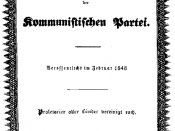Karl Marx and Marxism
Karl Marx set the wheels of modern Communism and
Socialism in motion with his writings in the late nineteenth
century. In collaboration with his friend, Heinrich Engels, he
produced the The Communist Manifesto, written in 1848.
Many failed countries' political and socio-economic structures
have been based on Marx's theories, for example the USSR, East
Germany etc. Many people believe that Marxism is not
applicable to today's society, as Karl Marx put forward his ideas
not anticipating the type of society we have today. The welfare
state system has effectively nullified Marx's arguments, and
made them irrelevant.
Karl Marx, born on May 5, 1818, died on March 14, 1883,
was a German economist, philosopher and revolutionist whose
writings form the basis of the body of ideas known as Marxism.
In his youth he was deeply affected by the philosophy of G.W.F.
Hegel, and joined a rebel group called the Young Hegelians,
which contributed ideas towards the movement against
organized religion and the Prussian Autocracy.
Later on in life,
he was influenced by the writings of Ludwig Feuerbach, who
wrote that God was invented by humans as a projection of their
own ideals, and that in creating such a 'perfect' being, in
contrast to themselves, mankind lowered themselves to lowly,
evil creatures who needed guidance from the church and
government. He said that, in creating God in their own image,
humans had 'alienated themselves from themselves.'
Karl Marx applied this alienation theory to private
property, which he said caused humans to work only for
themselves, not for the good of their species. The idea is
further explained in the following sentences. The people who
do the work in a capitalistic society own none of the means of
production, (ie. machines, raw produce etc.) that they use in...


